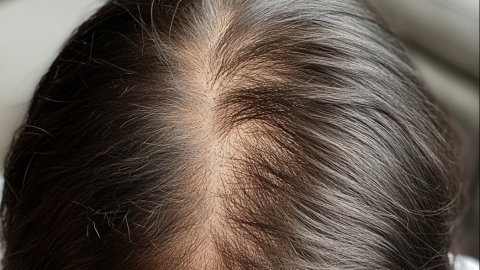What are the causes of severe hair loss?
Severe hair loss may be caused by aging, hormonal abnormalities, seborrheic dermatitis, alopecia areata, folliculitis, and other factors. Appropriate management methods can be chosen according to specific circumstances. If physical discomfort occurs, it is recommended to visit a hospital as soon as possible and follow medical advice for treatment.

1. Aging: With increasing age, bodily functions decline, follicular function gradually weakens, hair renewal slows down, and the amount of hair loss increases. In daily life, one can consume more protein-, vitamin-, and mineral-rich foods such as eggs, spinach, and nuts to provide nutrition for hair growth. Using mild shampoo and regularly massaging the scalp can promote blood circulation and improve hair loss to some extent.
2. Hormonal abnormalities: After childbirth, women experience drastic hormonal changes, with a significant drop in estrogen levels, causing many hair follicles to enter the resting phase, thus leading to hair loss. Postpartum women should maintain a cheerful mood, avoid anxiety, ensure adequate sleep for sufficient rest, and appropriately supplement trace elements such as iron and zinc, consuming more lean meat, fish, shrimp, and other foods.
3. Seborrheic dermatitis: Overactive sebaceous glands and excessive proliferation of Malassezia may cause inflammation, disrupting the follicular microenvironment and resulting in hair loss, accompanied by oily scalp, itching, and redness. Patients can use medications such as selenium sulfide shampoo, halcinonide solution, and vitamin B6 tablets under a doctor's guidance to promote recovery.
4. Alopecia areata: This condition typically occurs when the immune system mistakenly attacks hair follicles, potentially damaging them and causing round or oval patches of hair loss with clear boundaries and no signs of inflammation. It is recommended to use medications such as minoxidil solution, compound betamethasone injection, and compound glycyrrhizin tablets under medical guidance to alleviate symptoms.
5. Folliculitis: Folliculitis is usually caused by bacterial or fungal infections. If hair follicles become necrotic due to inflammatory irritation, hair can no longer grow normally, leading to hair loss. It is recommended to use medications such as mupirocin ointment, ketoconazole cream, and fusidic acid sodium ointment under a doctor's guidance to relieve discomfort.
Improving lifestyle habits, such as regular exercise, ensuring adequate sleep, and learning relaxation techniques, along with maintaining a light diet and balanced nutrition, also benefits hair health.
References:
[1] Lei Mingli, Huang Xi, Yan Wenjie. Study on the efficacy and safety of supramolecular salicylic acid combined with active zinc in improving seborrheic dermatitis of the scalp[J]. Journal of Clinical Dermatology, 2025, 54(03): 141-145.
[2] Lü Xingmin, Xu Maoting, Chen Guiquan. Causal relationship between gut microbiota and alopecia areata: A bidirectional two-sample Mendelian randomization study[J]. Chinese Journal of Leprosy and Skin Diseases, 2025, 41(01): 15-22.





